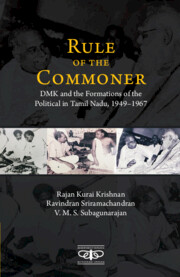5 - The Play Is the Thing
Published online by Cambridge University Press: 15 June 2022
Summary
I’ll have grounds
More relative than this—the play's the thing
Wherein I’ll catch the conscience of theKing.
—William Shakespeare, HamletThe Dravidianist journey in the terrain of arts andliterature that we call the domain of imaginationpreceded and substantially contributed to thefounding of the DMK. Of the many key interventionsAnnadurai made in the mid-1940s writing plays forthe stage assumes a unique significance sinceimagination takes the form of the performative andthe theatrical in a highly potent combination. Wehave already discussed AryanAllure, the seminal treatise he wrote in1944, which was to function as a kind of manifestofor the party that he would launch a few years laterin 1949. We will be discussing the intervention inliterary criticism, or rather a challenge to canonformation in Tamil that he made with regard to thetwelfth-century rendition of Ramayana in Tamil byKamban in the next chapter. We will also bediscussing the writing of prose fiction that hepopularized among the party men in Chapter 8. Of allthese, there is a reason to feel that the stageplayed the most crucial role. Given the fact of lackof literary training of the subaltern populace whenthey were barely literate, not to speak of the bulkof illiterate people, theater or plays had theunique facility to combine refined expression inlanguage with melodramatic imagination through whicha certain political sensibility could be cultivated.The language used in the play synchronized with themode of public address that the DMK leaderscultivated in terms of its rhetorical flourish. Suchdiscursive synergy was further enhanced by the factthat the DMK leaders themselves acted in these playswhich they wrote. In fact, perhaps it was the turnto imagination that created the ground for a newparty, the DMK, to be headed by Annadurai, who leadDravidianists in this new battlefront, recruitingable lieutenants like Karunanidhi to wage theculture war on the turf of imagination. The foray ofthe DMK leaders into cinema, enabled by the relativenewness of that cultural form that catered to thewhole of society than any other form that catered toselective audiences, has been muchoveremphasized.
- Type
- Chapter
- Information
- Rule of the CommonerDMK and Formations of the Political in Tamil Nadu, 1949–1967, pp. 105 - 122Publisher: Cambridge University PressPrint publication year: 2022



